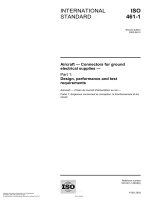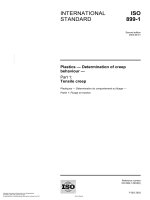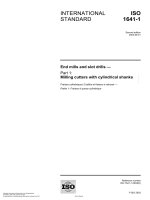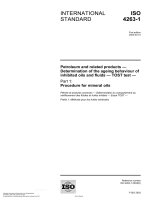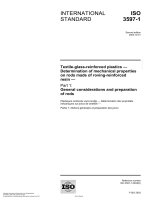Tiêu chuẩn iso 15142 1 2003
Bạn đang xem bản rút gọn của tài liệu. Xem và tải ngay bản đầy đủ của tài liệu tại đây (420.71 KB, 16 trang )
INTERNATIONAL
STANDARD
ISO
15142-1
First edition
2003-08-01
Implants for surgery — Metal
intramedullary nailing systems —
--`,,`,-`-`,,`,,`,`,,`---
Part 1:
Intramedullary nails
Implants chirurgicaux — Systèmes d'enclouage intramédullaire en
métal —
Partie 1: Clous intramédullaires
Reference number
ISO 15142-1:2003(E)
Copyright International Organization for Standardization
Provided by IHS under license with ISO
No reproduction or networking permitted without license from IHS
© ISO 2003
Not for Resale
ISO 15142-1:2003(E)
PDF disclaimer
This PDF file may contain embedded typefaces. In accordance with Adobe's licensing policy, this file may be printed or viewed but
shall not be edited unless the typefaces which are embedded are licensed to and installed on the computer performing the editing. In
downloading this file, parties accept therein the responsibility of not infringing Adobe's licensing policy. The ISO Central Secretariat
accepts no liability in this area.
Adobe is a trademark of Adobe Systems Incorporated.
--`,,`,-`-`,,`,,`,`,,`---
Details of the software products used to create this PDF file can be found in the General Info relative to the file; the PDF-creation
parameters were optimized for printing. Every care has been taken to ensure that the file is suitable for use by ISO member bodies. In
the unlikely event that a problem relating to it is found, please inform the Central Secretariat at the address given below.
© ISO 2003
All rights reserved. Unless otherwise specified, no part of this publication may be reproduced or utilized in any form or by any means,
electronic or mechanical, including photocopying and microfilm, without permission in writing from either ISO at the address below or
ISO's member body in the country of the requester.
ISO copyright office
Case postale 56 • CH-1211 Geneva 20
Tel. + 41 22 749 01 11
Fax + 41 22 749 09 47
Web www.iso.org
Published in Switzerland
ii
Copyright International Organization for Standardization
Provided by IHS under license with ISO
No reproduction or networking permitted without license from IHS
© ISO 2003 — All rights reserved
Not for Resale
ISO 15142-1:2003(E)
Contents
Page
Foreword ............................................................................................................................................................ iv
Introduction ........................................................................................................................................................ v
1
Scope...................................................................................................................................................... 1
2
Normative references ........................................................................................................................... 1
3
Terms and definitions........................................................................................................................... 1
4
Materials................................................................................................................................................. 4
5
Surface requirements ........................................................................................................................... 4
6
Marking................................................................................................................................................... 4
7
Product label ......................................................................................................................................... 4
8
Design requirements for insertion and removal ................................................................................ 4
Annex A (informative) ANSI B1.1 threads ........................................................................................................ 8
Bibliography ....................................................................................................................................................... 9
--`,,`,-`-`,,`,,`,`,,`---
iii
© ISO 2003 — All rights reserved
Copyright International Organization for Standardization
Provided by IHS under license with ISO
No reproduction or networking permitted without license from IHS
Not for Resale
ISO 15142-1:2003(E)
Foreword
--`,,`,-`-`,,`,,`,`,,`---
ISO (the International Organization for Standardization) is a worldwide federation of national standards bodies
(ISO member bodies). The work of preparing International Standards is normally carried out through ISO
technical committees. Each member body interested in a subject for which a technical committee has been
established has the right to be represented on that committee. International organizations, governmental and
non-governmental, in liaison with ISO, also take part in the work. ISO collaborates closely with the
International Electrotechnical Commission (IEC) on all matters of electrotechnical standardization.
International Standards are drafted in accordance with the rules given in the ISO/IEC Directives, Part 2.
The main task of technical committees is to prepare International Standards. Draft International Standards
adopted by the technical committees are circulated to the member bodies for voting. Publication as an
International Standard requires approval by at least 75 % of the member bodies casting a vote.
Attention is drawn to the possibility that some of the elements of this document may be the subject of patent
rights. ISO shall not be held responsible for identifying any or all such patent rights.
ISO 15142-1 was prepared by Technical Committee ISO/TC 150, Implants for surgery, Subcommittee SC 5,
Osteosynthesis and spinal devices.
ISO 15142 consists of the following parts, under the general title Implants for surgery — Metal intramedullary
nailing systems:
Part 1: Intramedullary nails
Part 2: Locking components
Part 3: Connection devices and reamer diameter measurements
iv
Copyright International Organization for Standardization
Provided by IHS under license with ISO
No reproduction or networking permitted without license from IHS
© ISO 2003 — All rights reserved
Not for Resale
ISO 15142-1:2003(E)
Introduction
Intramedullary nailing is a method of fixation for temporary stabilization of long bones with reduced strength
due to fractures or disease or both. Because of the wide variety of the devices, some illustrations are provided
in this part of ISO 15142. Medical and engineering considerations influence the design of the different devices
and the choice of a device for a particular clinical situation.
Nails are often, but not always, removed when they have completed their intended purpose of temporary
stabilization.
--`,,`,-`-`,,`,,`,`,,`---
v
© ISO 2003 — All rights reserved
Copyright International Organization for Standardization
Provided by IHS under license with ISO
No reproduction or networking permitted without license from IHS
Not for Resale
--`,,`,-`-`,,`,,`,`,,`---
Copyright International Organization for Standardization
Provided by IHS under license with ISO
No reproduction or networking permitted without license from IHS
Not for Resale
INTERNATIONAL STANDARD
ISO 15142-1:2003(E)
Implants for surgery — Metal intramedullary nailing systems —
Part 1:
Intramedullary nails
1
Scope
This part of ISO 15142 specifies metallic medical devices used for the temporary intramedullary stabilization
of long bones by surgical implantation, defining terms and giving requirements for intramedullary nails. It is
applicable to all metal intramedullary fixation devices used for temporary fixation of long bones in the human
body.
2
Normative references
The following referenced documents are indispensable for the application of this document. For dated
references, only the edition cited applies. For undated references, the latest edition of the referenced
document (including any amendments) applies.
ISO 965-1, ISO general-purpose metric screw threads — Tolerances — Part 1: Principles and basic data
ISO 965-2, ISO general purpose metric screw threads — Tolerances — Part 2: Limits of sizes for general
purpose external and internal screw threads — Medium quality
ISO 5832 (all parts), Implants for surgery — Metallic materials
ISO 14602, Non-active surgical implants — Implants for osteosynthesis — Particular requirements
ISO 14630, Non-active surgical implants — General requirements
3
--`,,`,-`-`,,`,,`,`,,`---
ISO 15142-3, Implants for surgery — Metal intramedullary nailing systems — Part 3: Connection devices and
reamer diameter measurements
Terms and definitions
For the purposes of this document, the following terms and definitions apply. See Figures 1 to 4 for examples
of various intramedullary nail types defined here.
3.1
angulated nail
nail whose longitudinal axis is angulated
3.2
Bundle nails
3.2.1
united bundle nail
nail made of a bundle of parallel rods that are fused to each other at one or more locations along the implant
length
1
© ISO 2003 — All rights reserved
Copyright International Organization for Standardization
Provided by IHS under license with ISO
No reproduction or networking permitted without license from IHS
Not for Resale
ISO 15142-1:2003(E)
3.2.2
un-united bundle nail
nail intended for use in parallel groups so that more than one nail is usually inserted in the intramedullary
cavity
NOTE
The individual nails are not joined to each other but may be in contact.
3.3
cannulated nail
intramedullary nail that has a hole along the longitudinal axis over its full length
--`,,`,-`-`,,`,,`,`,,`---
NOTE
The inner or outer contour of a hollow nail, or both contours, can be circular, polygonal, cloverleaf,
star-shaped, etc.
3.4
closed-section nail
cannulated nail whose cross-sections perpendicular to the nail’s longitudinal axis have no discontinuities along
the outer wall, other than for connection elements to accommodate locking components or insertion/removal
devices
3.5
connection element
integral part of the nail intended to connect the nail to a locking component or insertion/removal device
EXAMPLE
Hole, window, bore, slot (see Figure 5) or thread.
3.6
cross-arm
auxiliary component which is used for fixation into the femoral head or metaphysis and is intended to provide
additional stability across a fracture
3.7
cross-arm intramedullary nail
intramedullary nail whose function is dependent on the use of a cross-arm
3.8
curved nail
nail whose longitudinal axis is curved over at least a part of its length
3.9
Diameters
3.9.1
inner diameter
diameter of the largest circle which is enveloped by the contour of the cross-section of a hollow nail
See Figure 4.
NOTE
The site of measurement is indicated if the nail is not of uniform diameter throughout its length.
3.9.2
minimum inner diameter
maximum possible diameter of a guidewire of circular diameter over which the nail, which may be of variable
diameter, can be passed
3.9.3
outer diameter
diameter of the smallest circle that will envelop the outer cross-section of the nail
See Figure 4.
NOTE
The site of measurement is indicated if the nail is not of uniform diameter throughout its length.
2
Copyright International Organization for Standardization
Provided by IHS under license with ISO
No reproduction or networking permitted without license from IHS
© ISO 2003 — All rights reserved
Not for Resale
ISO 15142-1:2003(E)
3.10
insertion/removal device
device external to the nail which connects temporarily to the nail through the nail’s connection element(s) in
order to assist the insertion and/or removal of the nail
EXAMPLE
Driving handle, drill guide, extractor bolt or hook.
3.11 Lengths
3.11.1
effective length
length of the nail as measured by the shortest distance between the two ends
3.11.2
overall length
length of the nail as measured along the centreline of the nail from end to end
3.12
lockable intramedullary nail
intramedullary nail that has provisions for the application of locking elements to improve temporary fixation in
bone
See Figures 1, 2 and 3.
NOTE
These auxiliary components are not always used.
3.13
locking component
device or component which controls or minimizes relative motion between the intramedullary nail and bone
and which is designed to fit into the connection elements of the appropriate nail
EXAMPLE
Screw, blade, bolt or cross-arm.
3.14
multiple component nail system
nail system which consists of more than one major temporary fixation component, such as a cross-arm
configurations or bundle nails
3.15
open-section nail
cannulated nail whose cross-sections perpendicular to the nail’s longitudinal axis have one or more
discontinuities along the outer wall
3.16
single-component nail system
nail system that consists of one major temporary fixation component, except for locking components such as
bolts/screws
3.17
solid nail
nail with a solid cross-section over its entire length except for connection elements
The contour can be circular, polygonal, cloverleaf, star-shaped, etc.
3.18
straight nail
nail whose longitudinal axis is straight over its length
3
© ISO 2003 — All rights reserved
Copyright International Organization for Standardization
Provided by IHS under license with ISO
No reproduction or networking permitted without license from IHS
--`,,`,-`-`,,`,,`,`,,`---
NOTE
Not for Resale
ISO 15142-1:2003(E)
3.19
unlockable nail
nail which does not have provisions for locking components
See Figure 4.
4
Materials
The metallic materials used for an intramedullary nail shall be chosen in accordance with ISO 14602 and the
appropriate part of ISO 5832.
5
Surface requirements
The surface finish shall not adversely affect the biocompatibility of the metal used. The effect of surface finish
on biocompatibility shall be considered in the risk analysis for the device (see ISO 14602).
NOTE
The surface finish of the implant is normally selected so that it will not encourage surface bone ongrowth
which might make removal of the implant difficult or impossible.
6
Marking
The implant shall be marked on its surface in accordance with ISO 14630. In the case of anatomical shaping
or orientation (left or right) of the device, there shall be a unique marking to avoid wrong positioning.
7
Product label
The package shall be labelled in accordance with ISO 14630. The label shall include, as a minimum,
nail-specific information such as length and diameter.
8
Design requirements for insertion and removal
The nail design shall reflect the insertion/removal technique.
Slots shall comply with Figure 5, and accept the hooks as defined in ISO 15142-3.
Standard threads in the nail should conform to metric dimensions in accordance with ISO 965-1 and
ISO 965-2.
NOTE
Many existing nail designs utilize threadforms conforming to ANSI B1.1 designations 1/4-28, 5/16-24, 3/8-24,
7/16-20 and 9/16-18. Threadforms conforming to these designations can also be used. These designations are given in
Annex A for information.
4
Copyright International Organization for Standardization
Provided by IHS under license with ISO
No reproduction or networking permitted without license from IHS
--`,,`,-`-`,,`,,`,`,,`---
© ISO 2003 — All rights reserved
Not for Resale
--`,,`,-`-`,,`,,`,`,,`---
ISO 15142-1:2003(E)
Figure 1 — Example of lockable, hollow nail with cross-arm for proximal femur fractures
5
© ISO 2003 — All rights reserved
Copyright International Organization for Standardization
Provided by IHS under license with ISO
No reproduction or networking permitted without license from IHS
Not for Resale
ISO 15142-1:2003(E)
--`,,`,-`-`,,`,,`,`,,`---
Figure 2 — Example of lockable nail, tibia and femur, solid, angulated
Figure 3 — Example of lockable nail, humerus and distal femur, solid, straight
6
Copyright International Organization for Standardization
Provided by IHS under license with ISO
No reproduction or networking permitted without license from IHS
© ISO 2003 — All rights reserved
Not for Resale
ISO 15142-1:2003(E)
Key
1
2
outer diameter
minimum inner diameter
Figure 4 — Example of Kuntscher nail, open, cannulated, unlockable
Dimensions in millimetres
--`,,`,-`-`,,`,,`,`,,`---
a
Optional linear slot to accept extractor hook.
Dimensions in millimetres
IMFDa
Nail cross-section
diameter
Distance to slot
Slot length
Slot width
X
L
W
Cloverleaf: straight, curved, or double-ended
6 to 9
8
9
2,2
Cloverleaf: straight, curved, or double-ended
10 or larger
8
9
3,2
V-shaped
4 to 5
5
6
1,3
V-shaped
5,5 or larger
5
6
1,9
a
Intramedullary fixation device.
Figure 5 — Slot connection mechanism
7
© ISO 2003 — All rights reserved
Copyright International Organization for Standardization
Provided by IHS under license with ISO
No reproduction or networking permitted without license from IHS
Not for Resale
ISO 15142-1:2003(E)
Annex A
(informative)
ANSI B1.1 threads
See Table A.1 for ANSI screw thread diameters.
Table A.1 — Threads (as defined in ANSI B1.1)
Designation
Diameter
inch
mm
1/4-28
0,2500
6,35
5/16-24
0,3125
7,94
3/8-24
0,3750
9,53
7/16-20
0,4375
11,11
9/16-18
0,5625
14,29
--`,,`,-`-`,,`,,`,`,,`---
8
Copyright International Organization for Standardization
Provided by IHS under license with ISO
No reproduction or networking permitted without license from IHS
© ISO 2003 — All rights reserved
Not for Resale
ISO 15142-1:2003(E)
Bibliography
ANSI B1.1, Unified Inch Screw Threads (UN & UNR Thread Forms)
--`,,`,-`-`,,`,,`,`,,`---
[1]
9
© ISO 2003 — All rights reserved
Copyright International Organization for Standardization
Provided by IHS under license with ISO
No reproduction or networking permitted without license from IHS
Not for Resale
--`,,`,-`-`,,`,,`,`,,`---
ISO 15142-1:2003(E)
ICS 11.040.40
Price based on 9 pages
© ISO 2003 — All rights reserved
Copyright International Organization for Standardization
Provided by IHS under license with ISO
No reproduction or networking permitted without license from IHS
Not for Resale


